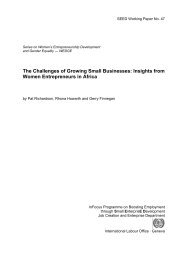manual: women workers' rights and gender equality - International ...
manual: women workers' rights and gender equality - International ...
manual: women workers' rights and gender equality - International ...
Create successful ePaper yourself
Turn your PDF publications into a flip-book with our unique Google optimized e-Paper software.
Basic human <strong>rights</strong> are <strong>rights</strong> a person has by being a human being. The main human <strong>rights</strong> are<br />
stated in the United Nations Universal Declaration on Human Rights (1948). In the Constitution of<br />
Cambodia it is explicitly mentioned that the Kingdom of Cambodia shall recognize <strong>and</strong> respect<br />
human <strong>rights</strong> as stipulated in the United Nations Charter, the Universal Declaration of Human<br />
Rights, the covenants <strong>and</strong> conventions related to human, <strong>women</strong>’s <strong>and</strong> children’s <strong>rights</strong>.<br />
Another important <strong>International</strong> Convention is the Convention on Elimination of all kinds of<br />
Discrimination Against Women (CEDAW) ratified by the Cambodian Government in 1992. This<br />
Convention was adopted as the earlier human <strong>rights</strong> declarations <strong>and</strong> conventions reflected mostly<br />
male concerns <strong>and</strong> frameworks. For example, there is no explicit reference to domestic violence in<br />
the Universal Declaration on Human Rights.<br />
Each country has a constitution in which your basic human <strong>rights</strong> are guaranteed.<br />
Those Constitutional <strong>rights</strong> are <strong>rights</strong> that are guaranteed to all citizens, regardless of their race,<br />
sex, ethnicity, cast, religion or status. In Cambodia these include:<br />
1. the right to equal treatment<br />
2. the right to life, personal freedom <strong>and</strong> security<br />
3. the right to vote<br />
4. the right to form/join an organization<br />
5. the right to express yourself freely<br />
6. the right to protection against violence <strong>and</strong> unfair treatment<br />
7. the right to freedom to travel<br />
8. the right to freedom of religion<br />
9. the right to ownership<br />
10. protection of the <strong>rights</strong> of the children<br />
Besides constitutional <strong>rights</strong> there are national legal <strong>rights</strong>, also guaranteed to all citizens. National<br />
legal <strong>rights</strong> are those <strong>rights</strong> which are defined by national laws in each country, usually consisting<br />
of constitutional <strong>rights</strong>, <strong>rights</strong> laid down in national legislation such as the Penal Code, the Labour<br />
Code <strong>and</strong> the Civil Code <strong>and</strong> rules such as government regulations (Prakas).<br />
In addition to the national laws such as the Penal Code, the Civil Code <strong>and</strong> the Labour Code there<br />
are Prakas: government rules <strong>and</strong> regulations. These provide detailed descriptions of some <strong>rights</strong><br />
in the national laws. Examples are the various Prakas on occupational safety <strong>and</strong> health issues.<br />
Rights <strong>and</strong> Responsibilities<br />
Emphasize during the session that <strong>rights</strong> come with responsibilities; it is not a one-way traffic<br />
situation. People should undertake action. As a citizen it is your responsibility, for instance, to<br />
collect information <strong>and</strong> to find out about your <strong>rights</strong>. The law does not come to you; you should<br />
collect the information yourself. Another responsibility is that you have to complain when a right is<br />
violated. Try also to motivate others to fight against the violation of <strong>rights</strong>.<br />
File a case<br />
You can file a case with the police if a right is violated. They have the duty to file the case <strong>and</strong> to<br />
investigate. It is advisable to go with a witness <strong>and</strong> always ask for a copy of the police report.<br />
Explain to participants that they can complain about the treatment of the police too.<br />
When a basic human right or constitutional right is violated you have the right to go to Court.<br />
However, there is nothing on paper about what the punishment will be or which procedure should<br />
be followed; therefore the outcome can differ from case to case.<br />
50

















